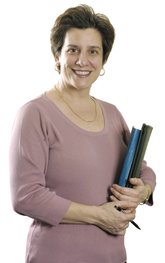Susan A. Ambrose is Carnegie Mellon’s associate provost for education, teaching professor in the Department of History, and director of the Eberly Center for Teaching Excellence, which offers programs to improve the quality of instruction at Carnegie Mellon. Programs include private consultations in course design, implementation, and evaluation; discussions of teaching and learning across departments and colleges; and seminars on teaching and learning.

How would you rate the teaching at Carnegie Mellon?
Oddly, when you look at all of the national rankings, they don’t talk about teaching. But Carnegie Mellon does a lot of student surveys, and the thing that scores well with the most consistency is the teaching.
Are students today the same as, or different from, students a generation ago?
Enormously different. The students who began college around 2000—the “millennials”—are unique in ways both positive and negative. Of course there are exceptions, but the majority of students seem to share some characteristics.
On the positive side, they grew up with collaborative experiences. They find it interesting and even fun to work in teams or groups, so they’re better at it than previous students.
On the negative side, they’ve been protected all of their lives. At the first sign of faltering, their parents talked with the coach or hired a tutor. The apron strings aren’t cut before college, and, often, when students talk with faculty—for instance, about a paper on which they didn’t do well—they want to bring Mom into the office or have Dad on the phone. We’re even hearing this from post-college employers: These students want their parents to negotiate their salaries.
Let’s talk about the use of technology. Carnegie Mellon isn’t giving all of its students iPods as some other places are—and yet this university is a technology leader.
I have strong feelings about this: Education should lead technology, not vice versa. It’s irresponsible just to jump on the bandwagon. Instead, we identify gaps in teaching or learning and then ask how we can fill those gaps. The appropriate responses may be technology-oriented—or not.
Frankly, we get beaten up for this. But nobody has shown that the use of iPods or laptops enhances teaching or learning. Nobody.
We’re doing a couple of studies to try to find some answers, and so far as we know, we’re the only place actually investigating these important issues. One study, with the School of Design, shows something interesting. Without laptops, students go to the computer lab; there’s more collaboration, more peer teaching and learning, and a sense of community. With laptops, students tend to show their designs to students in other disciplines; essentially, they get feedback from potential users of their designs. So the laptops are causing a tradeoff: one kind of feedback for another.
The other study involves “course-capturing,” committing a course to video the students can watch on iPods or laptops. Sometimes students attend the class and then review it on video; other times they watch the video—often in solitude—instead of attending class. We’re trying to understand what impact those behaviors have on teaching and learning and on the social and emotional development of students.
What other research is the Eberly Center doing?
We’re in the last phase of a longitudinal study of 55 students. We started before they were freshmen and interviewed them after every semester; most have now graduated. We want to know how their intellectual and social development plays out in this University’s unique culture. What have they learned? How have they grown and changed?
We’ll begin analyzing the data this summer; in about a year, we’ll have a summary of some of it. Then we’ll develop and release a series of findings. It’ll be interesting.
Do you see other differences in the “millennial” students?
Yes, because secondary education has changed. These students are as bright as any others we’ve seen—but our faculty, particularly those teaching first-year courses, note that the students are less well prepared. We think it’s probably related to initiatives like No Child Left Behind, because teachers feel they have to teach to the test rather than assure students’ deep understanding of a topic or discipline.
How highly is teaching valued at Carnegie Mellon—as highly, for example, as research?
I believe we take teaching more seriously, and value good teaching more, than our competitors do. Today, in most departments here, there’s the understanding that you have to be at least a pretty good teacher to be successful; you can’t be a miserably poor teacher—even if you’re a research star.
RELATED LINKS:
Susan A. Ambrose
Department of History
Eberly Center for Teaching Excellence
Laptop Study
Longitudinal Study of Student Experiences at Carnegie Mellon



